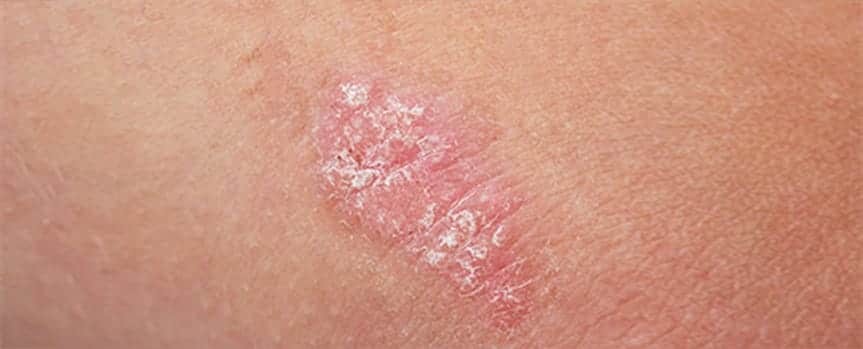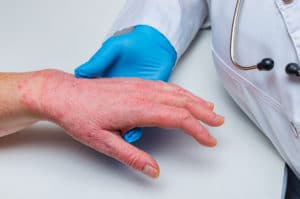Psoriasis Treatment in Coral Gables

What is Psoriasis?
Psoriasis is a skin disorder characterized by red patches of skin with white scales, which are created due to an overproduction of skin cells. When skin cells are formed too quickly, they result in rough patches of built-up dead skin. This is not only uncomfortable, but it can also be itchy and painful.
Often, psoriasis flares up without any obvious trigger and with no consistently predictable way to foresee the skin’s behavior. For these reasons, psoriasis can be one of the most troublesome skin conditions. However, dermatologists and skin care professionals can often provide effective ways to manage psoriasis.
What causes Psoriasis?
There are a number of potential causes for psoriasis, but according to recent research, the main cause is an immune system abnormality. Most people report their psoriasis flares up in response to an external factor, which may include:
- Certain medications
- Emotional stress, such as:
- New job
- Divorce
- Death of a loved one
Additionally, psoriasis tends to run in families, so you may have a higher risk of experiencing an outbreak if one of your family members suffers from the condition. Symptoms are often uncomfortable and, at times, embarrassing; however, symptoms usually subside after a few months and can be controlled with treatment.
What are the different types of psoriasis?
The most common forms of psoriasis include:
Plaque psoriasis
The most common type of psoriasis, causing loose scales and itching in the flare-up region
Guttate psoriasis
Characterized by small red dots that usually occur on the torso or arms
Inverse psoriasis
Occurs on folds of the skin and appear shiny and bright red in color
Pustular psoriasis
Flare-ups occur on the hands, palms, or feet and appear as tiny red blisters and scales
What are the symptoms of psoriasis?
Visit one of our experienced psoriasis dermatologists at the Florida Academic Dermatology Center if you experience any of the following psoriasis symptoms:
- Redness
- Itching
- Painful lesions
- Cracking
- Bleeding
- White or silver scales
- Discoloration of fingernails
Most commonly, psoriasis affects the following areas of the body:
- Knees
- Elbows
- Scalp
- Palms
- Soles of feet
- Torso
How is psoriasis diagnosed?
Diagnosing any skin condition will usually begin with visiting a dermatologist or skin doctor for a consultation. In most cases, our experts at the Florida Academic Dermatology Center can determine what your skin condition is through a simple and straightforward process that involves one or a combination of the following:
- Physical exam – involves the psoriasis doctor examining your skin to look for signs of psoriasis
- Medical history evaluation – involves your dermatologist asking you questions about your medical past and skin health over time
- Skin biopsy – when needed, includes taking a sample of your skin to examine under a microscope for an accurate diagnosis
How is psoriasis treated?
The biggest concern for those suffering from psoriasis is getting symptoms under control. Often, flare-ups can be effectively managed with treatment from a professional psoriasis dermatologist. Some of your treatment options might include the following:
- Certain topical creams
- Prescription medications
- Diet changes
- Lifestyle modifications
- Light therapy
At the Florida Academic Dermatology Center, we also offer a number of clinical trials targeted towards new, cutting-edge therapies for psoriasis.
Schedule A Consultation
If you are experiencing symptoms of psoriasis, visit the Florida Academic Dermatology Center, a dermatology and research clinic dedicated to offering the best psoriasis treatment options, including scalp psoriasis treatment.
Our state-of-the-art facility provides compassionate medical care using world-class, cutting-edge treatments. Call us today at (305) 324-2110 or fill out the form on this page to request an appointment.
